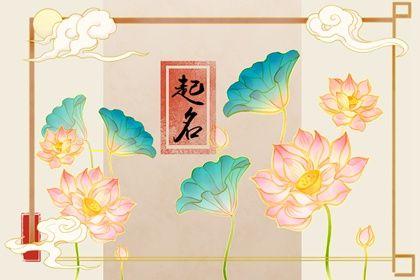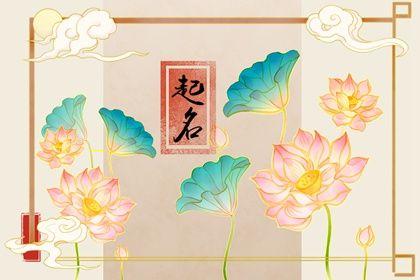以诗字起名字究竟是不是寓意良好呢
- 作者: 李恩橙
- 来源: 投稿
- 2024-07-25
一、以诗字起名字究竟是不是寓意良好呢
以“诗”字起名字的寓意
“诗”字在汉语中具有丰富的内涵,寓意美好,常用于人名中。
正面寓意:文采斐然:诗歌是文学艺术的代表,以“诗”字起名寓意孩子才华横溢,文采出众。
浪漫情怀:诗歌往往表达情感和想象,以“诗”字起名寓意孩子富有浪漫情怀,想象力丰富。
高雅脱俗:诗歌具有高雅脱俗的气质,以“诗”字起名寓意孩子品行高尚,气质不凡。
志向远大:诗歌常寄托作者的理想和抱负,以“诗”字起名寓意孩子志向远大,胸怀宽广。
负面寓意:空想主义:诗歌有时会脱离现实,以“诗”字起名可能会让人联想到空想主义,缺乏实际行动力。
过于理想化:诗歌往往描绘理想化的世界,以“诗”字起名可能会让人觉得过于理想化,脱离实际。
不切实际:诗歌中的意象和情感有时过于抽象,以“诗”字起名可能会让人觉得不切实际,难以理解。
综合来看:以“诗”字起名字寓意总体上是良好的,但需要注意以下几点:
结合孩子的性格和特点:名字应与孩子的性格和特点相符,避免出现寓意与实际不符的情况。
避免过于抽象:名字应尽量避免使用过于抽象的意象,以免让人难以理解。
注重实际:虽然诗歌具有浪漫情怀,但名字也应注重实际,避免过于理想化。
因此,以“诗”字起名字是否寓意良好,需要综合考虑孩子的性格、名字的具体含义以及实际情况。
二、以诗字起名字究竟是不是寓意良好呢怎么读
以“诗”字起名字的寓意
“诗”字在汉语中寓意丰富,一般有以下含义:
文采斐然:诗歌是文学艺术的瑰宝,以“诗”字起名寓意孩子才华横溢,文采出众。
浪漫情怀:诗歌往往寄托着作者的情感和想象,以“诗”字起名寓意孩子富有浪漫情怀,想象力丰富。
高雅脱俗:诗歌具有高雅脱俗的艺术气质,以“诗”字起名寓意孩子气质出众,品味不凡。
志向远大:诗歌中常表达作者的理想和抱负,以“诗”字起名寓意孩子志向远大,胸怀宽广。
“诗”字的读音“诗”字的普通话读音为 shī,一声。
以“诗”字起名的例子诗涵:寓意文采斐然,涵养丰富。
诗韵:寓意浪漫情怀,韵味十足。
诗雅:寓意高雅脱俗,品味不凡。
诗远:寓意志向远大,胸怀宽广。
诗晴:寓意文采斐然,气质出众。
结论以“诗”字起名字寓意良好,寄托了父母对孩子才华、情怀、气质和志向的期望。读音为 shī,一声。

三、以诗字起名字究竟是不是寓意良好呢英语
Whether the Chinese character "诗" (shī) is auspicious in a name depends on personal beliefs and cultural context.
Positive Interpretations:
Literary talent: "诗" is associated with poetry and literature, suggesting creativity, imagination, and artistic expression.
Beauty and elegance: The character evokes images of beautiful poems and elegant calligraphy, implying refinement and grace.
Harmony and peace: Poetry often expresses emotions and ideas in a harmonious and peaceful manner, suggesting a balanced and tranquil nature.
Inspiration and wisdom: Poetry can inspire and provide insights, implying a person with a curious and open mind.
Negative Interpretations:
Excessive sensitivity: Some believe that people with "诗" in their names may be overly sensitive or emotional.
Lack of practicality: Poetry is often seen as a pursuit of the imagination rather than practical matters, suggesting a person who may be impractical or unrealistic.
Unpredictability: Poetry can be unpredictable and open to interpretation, implying a person who may be difficult to understand or predict.
Cultural Context:
In Chinese culture, the character "诗" is generally considered auspicious, especially for people in the arts or academia. However, personal preferences and beliefs can vary.
Conclusion:
Whether "诗" is a good choice for a name depends on the individual's beliefs and the context in which it is used. It can convey positive qualities such as literary talent, beauty, and inspiration, but it may also be associated with sensitivity or impracticality. Ultimately, the decision of whether to use "诗" in a name is a personal one.
四、用诗字取名字有什么寓意
寓意一:才华横溢诗字在古代指诗歌,代表着文学才华和艺术修养。用诗字取名,寓意孩子才华横溢,文采斐然。
寓意二:浪漫情怀诗歌往往寄托着作者的情感和想象,具有浪漫主义色彩。用诗字取名,寓意孩子拥有浪漫的情怀,富有想象力。
寓意三:气质优雅诗歌讲究格律和韵律,给人以优雅之感。用诗字取名,寓意孩子气质优雅,举止得体。
寓意四:胸怀宽广诗歌往往反映社会现实,具有宽广的胸怀。用诗字取名,寓意孩子胸怀宽广,心胸豁达。
寓意五:志向远大诗歌中常寄托着作者的理想和抱负。用诗字取名,寓意孩子志向远大,胸怀天下。
寓意六:品德高尚诗歌中常赞美真善美,批判假恶丑。用诗字取名,寓意孩子品德高尚,正直善良。
寓意七:记忆深刻诗歌具有朗朗上口的特点,容易让人记忆深刻。用诗字取名,寓意孩子名字响亮好记,给人留下深刻印象。
寓意八:传承文化诗歌是中国传统文化的重要组成部分。用诗字取名,寓意孩子继承和发扬中华传统文化。




